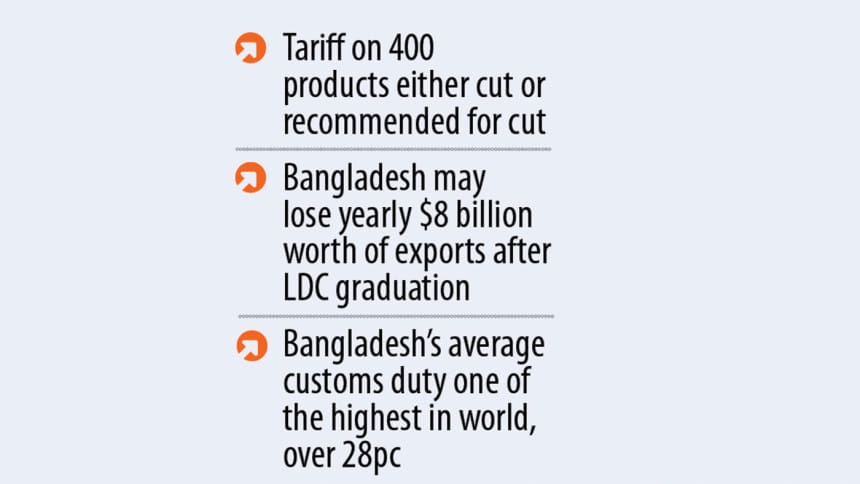Import duty cut for LDC graduation: Long way to go for readiness

The government has proposed removing and reducing import duties and supplementary duties on 282 products in fiscal year 2024-25 as it continues its efforts to prepare the nation for its graduation out of the Least Developed Country grouping.
Experts, however, say the moves are inadequate and the government is leaving a lot to do before the country graduates in 2026.
In the current fiscal year, it withdrew import duties on 191 products and supplementary duties on 234 products.

Next year, it wants to withdraw supplementary duties on 19 more products and reduce supplementary duties on 172 and withdrawal duties on 91 others.
Once Bangladesh graduates in November 2026, it may lose yearly $8 billion worth of exports to erosion of trade preferences.
Mohammad Abdur Razzaque, chairman of Research and Policy Integration for Development (RAPID), said the measures for dealing with the post-graduation challenges were inadequate.
He said the government was cutting supplementary duties, regulatory duties and has recommended further duty cuts on a few products and their number was not big.
Razzaque, however, said the government was not withdrawing or reducing customs duties.
Since Bangladesh's average customs duty is one of the highest in the world, more than 28 percent, many major trading partners would feel discouraged to sign a free-trade agreement with the country, he said.
The global average customs tariff hovers around 7.5 percent. India's average is 14 percent, the USA's 2.5 percent, and the EU's 4 percent, said Razzaque.
For instance, Bangladesh is negotiating with Japan for an Economic Partnership Agreement (EPA) to retain the duty-benefits after it graduates. If the EPA goes through, Bangladesh will have to cut duty on 90 percent of the products being considered.
The duty could be gradually cut like over a 10-year period, but it has to be done for a trade deal and the products in question for Bangladesh is nearly 14,000, he said.
The government in its budget said it was trying to sign free-trade agreements with major trading partners like Japan, India, and China to retain duty benefits after it graduates.
But so far, it has signed only a preferential trade agreement (PTA) with Bhutan.
Currently, the customs department fixes a minimum import price on products. Since Bangladesh is in LDC, developed and developing countries do not argue over the matter in the World Trade Organisation.
But after the graduation, the government would not be able to fix the minimum price under the WTO rules.
The government has now decided to gradually abolish the system of minimum import price by 2026.
To prepare for the graduation, the government formed a committee to deal with the challenges. The committee is led by the principal secretary to the prime minister. The committee has seven sub-committees.
Since businesses won't be able to have direct cash subsidies after the country graduates from LDC, the government has come up with some alternatives to improve competitiveness of local exporters.
A senior official at the customs department, requesting anonymity, said the duty cuts were not adequate but the process has started. The process is slow as the government needs to generate revenue and consider the interest of the local industries. So far, duties on more than 400 products have either been cut or have been recommended for cuts.
Mustafizur Rahman, distinguished fellow at the Centre for Policy Dialogue (CPD), echoed Razzaque.
He said the government has at least used a sub-section in the proposed budget on LDC graduation. In the next budget, a major chapter might be dedicated to the graduation and there might be big challenges to address.
He acknowledged that the government had taken a lot of major measures to make the local business competitive in the global market when Bangladesh graduates.

 For all latest news, follow The Daily Star's Google News channel.
For all latest news, follow The Daily Star's Google News channel. 










Comments